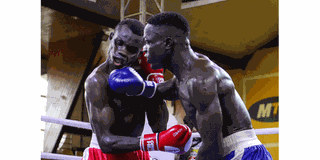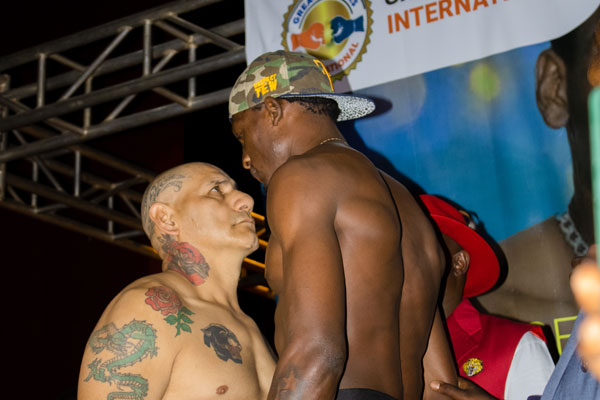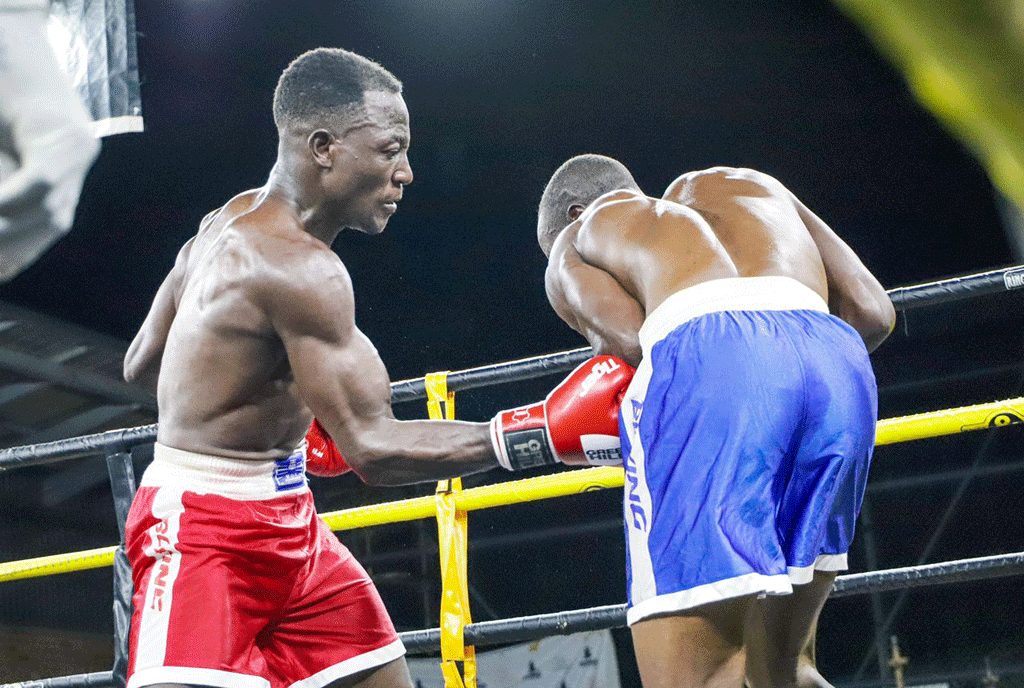Prime
From offloading goats at abattoir, Kyobe dreams Birmingham glory

Growing reputation. Kyobe (right) outpunched Isaac Kamoga in the featherweight bout during Week Three of the Boxing Champions League. PHOTO/COURTESY
What you need to know:
- Over the years, Kyobe has built a capital from his small savings and started buying his own goats and selling electronics.
Born and raised in the shanty ghettos of Kazo, Kawempe Division, Jonah Kyobe, aka Military Puncher, left his peasant family at a young age.
Aged about eight, the third-born of his mother’s five children joined a mataali group and soon converted to Islam, acquiring the name Farouk.
He dropped out of Bombo Army Secondary School in Senior One when his parents couldn’t afford the fees. The teenager would then join the city abattoir in Kalerwe on Gayaza Road to look for survival.
“People often chased us away saying we were too young for such a job. But I insisted until they let me be,” Kyobe says.
He would drag goats from the trucks to the waiting area, then to the slaughter house. That would earn him Shs1,000 per goat and on a good day, the ghetto youth could bob home with a healthy Shs35,000, far better than what a high school teacher makes a day.
Over the years, Kyobe has built a capital from his small savings and started buying his own goats and selling electronics.
“I can now say I’m my own boss, which is very encouraging especially when I look back at the early days, when people used to toss us around,” says the father of two.
Meeting mentor
Kyobe’s entire life revolves around the abattoir. There he found a job, met friends and Hamza Ssempewo, who taught him boxing. “He told me boxing would give me self-defense and a name.”
He says his first bout was around 2012, yet in that 10-year spell, he has managed just about 20 amateur fights, because he has been on-and-off the scene.
Herbert Kalungi, founder of Sparks Academy, was one of his first opponents. “He won the first fight, I won the second.” He also talks of a revenge match where he defeated Juma Miiro long before he won bronze at the 2018 Commonwealth Games in Gold Coast.
“He had beaten me in the first one, but in the second meet I broke his jaw,” he jokes.
Sacrifices
“My abattoir job fits me; it gives me ample time to train; basically, being employed wouldn’t work for me. I’m not good at giving excuses and some bosses can be restrictive.”
Still, there are sacrifices. Business always booms at the abattoir during Idd ul Aduha, as Muslims sacrifice animals in remembrance of Ibrahim and his son.
Kyobe would have wanted to be at work, but no one was going to allow him out.
“I’m going nowhere,” he said during the interview, a week before peak time. “The coaches know if I go out I might lose all the fitness I have built, yet we just need to get better,” Kyobe adds, insinuating that residing in a camp is ideal to shield the boxers’ from sexual suitors. “You know many see us as celebs, everyone wants a piece of us.”
It is such sacrifices that make success even sweeter or defeat bitterer.
Turning point
The 2018 National Intermediates was the tournament that introduced Kyobe to the public. It was hosted in Bwaise, just a stone’s throw from where his club, Zebra Boxing Club, trains from.
In the Youth Lightweight category, Kyobe worked the crowds with spirited performances despite the unforgiving afternoon sun. He stopped Muzamir Arafat of Mutajazi Boxing Club, won a decision against the resilient Badru Kawooya (Saku Boxing Club) before defeating Dubai-based Ivan Kagimu of Cobap to claim gold.
He would claim silver at the National Open in 2019, losing the final to East Coast’s Jaffar Onen but just when boxing welcomed “the new boy” he vanished off the scene.
“I somehow got busy with work,” he says.
Missing Olympics
Back on the scene, Kyobe was among those seeking qualification for the Tokyo 2020 Olympics. But he lost the national trials to Isaac Masembe, fresh from winning silver at the African Games in Rabat, Morocco.
And Masembe was no lucky medallist. He had earned his pride. Kyobe was stubborn but Masembe used his experience to edge the featherweight contest witnessed by a rowdy crowd inside the MTN Arena, Lugogo.
“I still hurt that I didn’t win that fight; because I think I did my best to win,” Kyobe says. “Even Masembe admitted to one coach that he felt my power. But that’s life, the judges preferred him. Maybe because of that medal he had just won.”
Nevertheless, Kyobe was summoned among the Bombers who camped at Luzira Prison ahead of the trip to Dakar, Senegal, for the African Olympic Trials in February 2020. Sparring with Joshua Tukamuhebwa, Yasin Adinan, Isaac Ssebuufu – the best on the national scene – sharpened Kyobe’s skills and boosted his confidence.
Come the national trials last year, the first tournament since Covid-19 outbreak, Kyobe wanted to settle his score with Masembe but the two were seeded and did meet until the event was altered at the semi-final stage.
“Even if you dodge me, we’ll meet in the league’” Kyobe thought. But Masembe was among the elite boxers who rejected contracts for the inaugural Champions League, citing unclear terms of payment.
Kyobe missed the revenge match but somehow, Masembe’s defiance was a disguised blessing because apart from his club mate Marvin Ssali, none of his other league opponents was more experienced.
Decisive fight
Kyobe started the league well aware that it was the only pathway to the 2022 Commonwealth Games and he gave it his best. “But I didn’t like fighting Marvin [Ssali].”
Kyobe represented Lukanga Boxing Club, while Ssali represented Zebra but both clubs share almost everything: boxers, trainers, training ground and fans. What Kyobe lacked in experience he had in power. “I could have stopped him but decided to box him through the fight. Because we are brothers,” he says.
Sadly, the animosity he tried to avoid eventually happened. “Our fanbase got divided and I’ve never talked with Marvin again.”
With two losses in a row, Ssali sought greener pastures in Dubai.
Then came the decisive bout in late February: Kyobe vs Derrick Mubiru. Reward: ticket to Birmingham. Since his first national tournament in 2015, Mubiru wanted to emulate his father Martin, who won bronze at the 2006 Commonwealth Games in Melbourne.
Kyobe had no such heritage but vowed to beat both father and son – a trash talk that got to Derrick’s head.
Few match Kyobe’s power and he unleashed thunder right from the first bell. Derrick’s biggest mistake was attempting to overpower him. It backfired terribly. Kyobe won the showdown at Club Obligato 4-1.
“I wasn’t going to let that boy defeat another boxer from Bwaise,” Kyobe says complacently. “I came to punish him and silence the noise from Hoima Road. But he has a strong head, anyone would have given up.”
Expectations
Three wins from as many fights, Kyobe was guaranteed a place at the Commonwealth Games, his first international assignment.
At the Kilimanjaro Open in May, he alongside Joshua Tukamuhebwa and Yusuf Nkobeza won gold, getting a feel of winning a medal for the country.
But what does he expect in Birmingham? “Whites are faster, that’s why I’m working on my shadowboxing to improve my speed. I need that medal.”
Kyobe at a glance
Born: June 10, 1996
Place: Kazo-Kawempe
Age: 26
Club: Lukanga
Stance: Orthodox
Parents: Irene Nabukenya and Tendo Nakabaale




